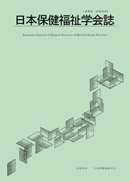Volume 16, Issue 1
Displaying 1-5 of 5 articles from this issue
- |<
- <
- 1
- >
- >|
-
Article type: Article
2010Volume 16Issue 1 Pages 1-9
Published: February 01, 2010
Released on J-STAGE: September 15, 2017
Download PDF (1045K) -
Article type: Article
2010Volume 16Issue 1 Pages 11-29
Published: February 01, 2010
Released on J-STAGE: September 15, 2017
Download PDF (2111K) -
Article type: Article
2010Volume 16Issue 1 Pages 31-42
Published: February 01, 2010
Released on J-STAGE: September 15, 2017
Download PDF (924K) -
Article type: Article
2010Volume 16Issue 1 Pages 43-55
Published: February 01, 2010
Released on J-STAGE: September 15, 2017
Download PDF (1177K) -
Article type: Article
2010Volume 16Issue 1 Pages 57-66
Published: February 01, 2010
Released on J-STAGE: September 15, 2017
Download PDF (989K)
- |<
- <
- 1
- >
- >|
